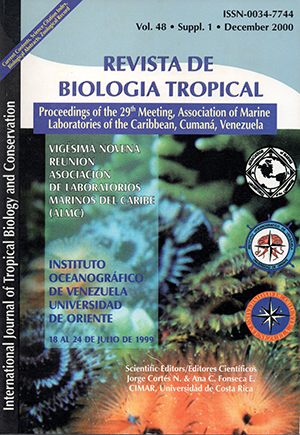Abstract
Temperature affects growth rate in aquatic organisms. This can be evaluated in short term using biochemical indexes (RNA/DNA and Protein/DNA). The effect of acclimatization temperature on the instantaneous growth and physiological condition of Perna viridis was studied in organisms collected in La Esmeralda, Sucre Slate (Venezuela) and taken to the laboratory, where groups of 100 organisms (size 3.0 - 3.5 cm, aliteroposlerior measurement) were acclimatized at 15, 20, 26 or 28°C during four weeks. Later they were kept in a 60 liters aquarium for another six weeks under the same conditions. Each week, ten organisms per group were extracted to measure concentrations of RNA, DNA (by a fluorometric method with ethidium bromide) and proteins (by a colorimetric method), in tissues (digestive gland, adductor muscle and gills). Protein concentration was greater and highly significant at 15°C for all studied tissues. The opposite was obtained with the RNA/DNA and Protein/DNA ratios: the greatest increase was observed at the highest temperature (28"C) for all tissues. At the low est temperature there was a tendency 10 reduce both indexes with time. Greater instantaneous growth can be expected at higher temperatures and 28"C was optimal for growth in these specimens.##plugins.facebook.comentarios##

This work is licensed under a Creative Commons Attribution 4.0 International License.
Copyright (c) 2000 Revista de Biología Tropical
Downloads
Download data is not yet available.


